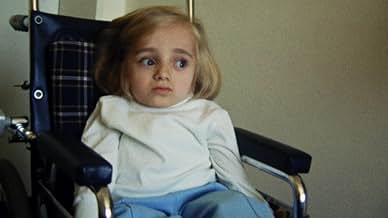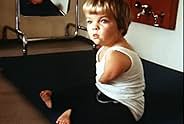CALIFICACIÓN DE IMDb
7.0/10
525
TU CALIFICACIÓN
Documental sobre el tratamiento dado a lisiados en Múnich, Hannover y Los Ángeles.Documental sobre el tratamiento dado a lisiados en Múnich, Hannover y Los Ángeles.Documental sobre el tratamiento dado a lisiados en Múnich, Hannover y Los Ángeles.
- Dirección
- Guionistas
- Elenco
- Dirección
- Guionistas
- Todo el elenco y el equipo
- Producción, taquilla y más en IMDbPro
Opiniones destacadas
This early documentary from Werner Herzog looks at the way people with physical disabilities were treated in West Germany in the late 60's / early 70's. It compares this with the manner things were contrastingly done in the U.S.A. The findings conclude that the Americans were far more progressive than the Germans on this issue.
At the time, special buildings were built for disabled kids to live with their families. On the surface this seems good but these were, in effect, a means of hiding those unfortunate people away as much as an aid to assisting them. Bearing in mind the time period, it was only twenty odd years after the end of the Second World War; a period where Germany was ruled by the Nazi party, who actively pursued the extermination of disabled people whom they considered inferior. It seems like a little of this unpleasant sentiment still resided in the new Germany of the 70's. There are many interviews with the afflicted children. These are mainly pretty sad on account of the fact that they didn't really see any worthwhile future ahead of them, hence the title of the film.
As a documentary it works as a look back at a situation from another time. It's useful for this specific purpose but of course this specific issue has changed considerably over the years and, hence, this film is more of an interesting time capsule than anything essential.
At the time, special buildings were built for disabled kids to live with their families. On the surface this seems good but these were, in effect, a means of hiding those unfortunate people away as much as an aid to assisting them. Bearing in mind the time period, it was only twenty odd years after the end of the Second World War; a period where Germany was ruled by the Nazi party, who actively pursued the extermination of disabled people whom they considered inferior. It seems like a little of this unpleasant sentiment still resided in the new Germany of the 70's. There are many interviews with the afflicted children. These are mainly pretty sad on account of the fact that they didn't really see any worthwhile future ahead of them, hence the title of the film.
As a documentary it works as a look back at a situation from another time. It's useful for this specific purpose but of course this specific issue has changed considerably over the years and, hence, this film is more of an interesting time capsule than anything essential.
Worthwhile early documentary from Herzog exploring the different treatment accorded to the disabled in Germany and the USA. Given the then fairly recent history of Germany there are resonances in this film that will not have been lost on its original audience.
Certainly at the time the film was made disabled rights were decades ahead in the US; among other things this is a powerful and compassionate campaigning documentary.
See it with "Land of Silence and Darkness" if you can. The two films, made in the same year, share a lot and in fact I believe the making of the second flowed directly from the first.
Certainly at the time the film was made disabled rights were decades ahead in the US; among other things this is a powerful and compassionate campaigning documentary.
See it with "Land of Silence and Darkness" if you can. The two films, made in the same year, share a lot and in fact I believe the making of the second flowed directly from the first.
Handicapped Future (1971)
** 1/2 (out of 4)
Werner Herzog documentary that takes a look at handicapped children in German and how the government pretty much guarantees that they'll have no future whereas in America the laws allow the handicapped to live a full life. The documentary has a lot of interviews with the young children and their thoughts on the future are pretty depressing but overall the film is pretty boring because instead of learning anything we usually just sit there and watch the children play or learn. The documentary gets a refreshing start when we hit the USA and see how differently things are compared to Germany where the crippled are mainly put off by regular people.
** 1/2 (out of 4)
Werner Herzog documentary that takes a look at handicapped children in German and how the government pretty much guarantees that they'll have no future whereas in America the laws allow the handicapped to live a full life. The documentary has a lot of interviews with the young children and their thoughts on the future are pretty depressing but overall the film is pretty boring because instead of learning anything we usually just sit there and watch the children play or learn. The documentary gets a refreshing start when we hit the USA and see how differently things are compared to Germany where the crippled are mainly put off by regular people.
HANDICAPPED FUTURE is another moving documentary focusing on the plight of the disabled in West Germany, made by auteur Werner Herzog. It's not as in depth as his film that dealt with the deafblind, the feature length LAND OF SILENCE AND DARKNESS, but it's nonetheless a story that packs a punch as the director explores the way that disabled children struggle to integrate into a modern society.
Most of the kids are Thalidomide victims and it's certainly distressing viewing watching their natural good-natured spirits combine with their overwhelming disability. Some scenes, like where a child draws tears on her self-portrait, are quietly distressing, and yet as always Herzog lets the subject matter tell the story, always refusing to condemn or preach. The latter stages of the documentary move to America, showing in contrast the life of a disabled man who's able to live a relatively normal life thanks to that country's support system. Food for thought for sure.
Most of the kids are Thalidomide victims and it's certainly distressing viewing watching their natural good-natured spirits combine with their overwhelming disability. Some scenes, like where a child draws tears on her self-portrait, are quietly distressing, and yet as always Herzog lets the subject matter tell the story, always refusing to condemn or preach. The latter stages of the documentary move to America, showing in contrast the life of a disabled man who's able to live a relatively normal life thanks to that country's support system. Food for thought for sure.
Selecciones populares
Inicia sesión para calificar y agrega a la lista de videos para obtener recomendaciones personalizadas
Detalles
Taquilla
- Presupuesto
- DEM 81,000 (estimado)
- Tiempo de ejecución42 minutos
- Mezcla de sonido
- Relación de aspecto
- 1.33 : 1
Contribuir a esta página
Sugiere una edición o agrega el contenido que falta

Principales brechas de datos
By what name was El futuro truncado (1971) officially released in Canada in English?
Responda

















